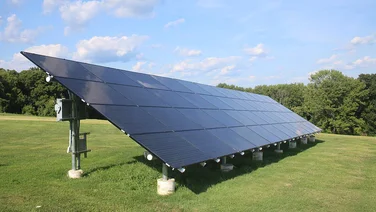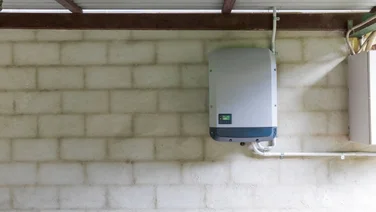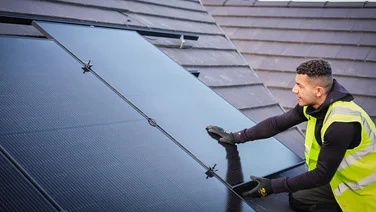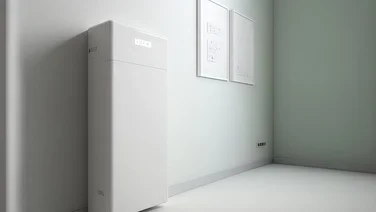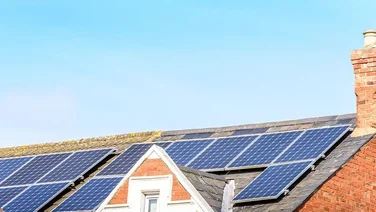We receive a small fee from trusted installers when you request a quote through our site. This helps us keep our content independent, well-researched and up to date – Learn more
✔ Andrew has a 3.95 kWh system, which cost close to £6,000
✔ He’s saving £32.93 on his monthly bills
✔ He’s also projected to save around a tonne of CO2 a year with his panels
We spoke with Andrew from Harrogate, North Yorkshire, about his solar panel system.
After considering getting solar panels for roughly 10 years, Andrew decided to take the leap and invest in solar to help save money on rising energy costs and reduce his carbon footprint.
So if you’re interested in hearing about what it’s like having solar panels, whether solar energy typically covers electricity bills, and what solar panel costs are involved, read on.

Q: How long have you had your solar panels?
A: The panels went live on the morning of 5 July 2022.
Q: Why did you decide to get solar panels?
A: I first considered solar PV when the feed-in tariff was introduced some 10+ years ago. My main motivator at that time was the potential payments but the installations were expensive – I think in the region of £12,000.
Earlier this year when the energy prices started to soar, I decided to revisit the project to mitigate my future expenses on energy. But equally, I have become much more aware of my carbon footprint and see this as a way to reduce it.
Q: Are you pleased you bought solar panels?
A: It’s early days and we’ve been experiencing a heatwave, but yes, I am pleased.
Q: How big is your solar panel system, and how roughly much did it cost?
A: The system is 3.95 kWh and it cost close to £6,000 – significantly cheaper than when I first looked at it.
Want to learn more about the price of solar panels? Head to our solar panel cost page.
Q: What was the experience like buying the panels?
A: I did my own research on potential suppliers/installers mostly fairly local to me.
The most difficult part of the process is getting a quote. Between 23 March and 5 April 2022, I approached eight companies and asked them to come up with a design and quote.
Out of the eight, one declined to quote, one national company quoted by surveying using Google Earth, one replied after the panels were installed, and two local companies finally came back to me on 16 May and 22 June. The rest I never heard from.
The latter quote was the one I accepted, and as they stock the panels, it was all installed and running by 5 July.
So in short getting a survey/quote is difficult, but getting an installation is easy.
There is also a delay in getting the installation registered with the local grid and hence receiving the necessary paperwork to claim the SEG.
As a side note, you need to make sure your potential installer is MCS registered, and you should notify your home insurer of your plans.
Q: Do you have a solar battery?
A: I have just installed the panels for now. I do intend to get batteries, but I want at least six months of real data first, so I can understand the battery size I will need to be as close to off-grid as possible, as well as what has the best value in terms of payback.
I also intend to install a Solar iBoost, which detects if you are exporting to the grid. If you are, it diverts it to your hot water emersion heater, potentially saving some gas.

Q: Do your solar panels generate enough power to cover all your electricity needs?
A: From 5 July to 21 August 2022, the panels have generated 833 kWh and I’ve used 427 kWh. So, in theory, I’m generating more than enough for my own needs.
But peak generation and peak use don’t coincide, so my usage has been 228 kWh from the grid and 199 kWh from solar.
I have used the grid every day to some degree. It’s also summer, so this ratio will change as the seasons change.
Whilst we are trying to be smart by using the dishwasher, washing machine, and dryer only when the panels are in full flow, I think it supports the need for batteries.
Q: How much money do your solar panels save you on your electricity bills, if at all?
A: I am fortunate to be on a fixed tariff of £0.1655 per kWh until next May. So over the short time I’ve had the panels, I’m saving £32.93 on my monthly bills (199 kWh x £0.1655).
Q: Are you receiving money via the Smart Export Guarantee?
A: My SEG will pay £0.055 per kWh once the paperwork is registered.
I have exported 634 kWh since installation, which equates to £34.87.
To claim the SEG, you will need a smart meter that transmits every 30 minutes, and is capable of reading export and import.
You will then need to contact your electricity supplier and register as a vendor by filling out their forms and supplying details of your installation.
If you want to change electricity suppliers in the future, it does make it a little more complicated. Although, I haven’t worked out yet whether you have to import and export from the same supplier.
Q: How has your opinion of solar panels changed over time?
A: I don’t think it has much as I expected to date, but we’ll see what winter brings.
Q: Do you feel likely to buy other types of renewable technology?
A: As above, batteries and Solar iBoost for the PV system.
Once I have a clear picture of how the panels perform over the seasons and how much battery support I need, I may consider a heat pump if there is sufficient capacity to power it. I’ve also been doing some research on domestic wind turbines.
A then an electric car is unlikely at the moment, as the technology is not there for longer journeys.
Q: Would you recommend solar panels to other homeowners in the UK?
A: Yes they definitely work, but it is still a significant investment – especially if you start adding batteries.
However, as well as saving money on my electricity bills, I am projected to save around a tonne of CO2 a year – possibly more with a Solar iBoost fitted and then more again with batteries.

